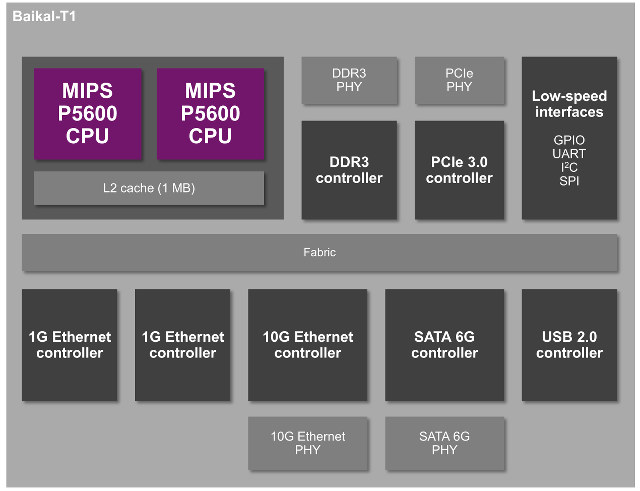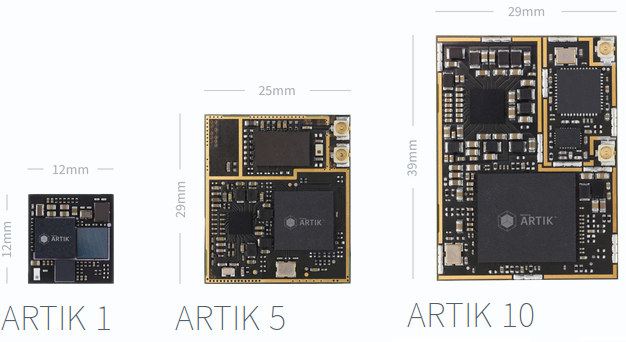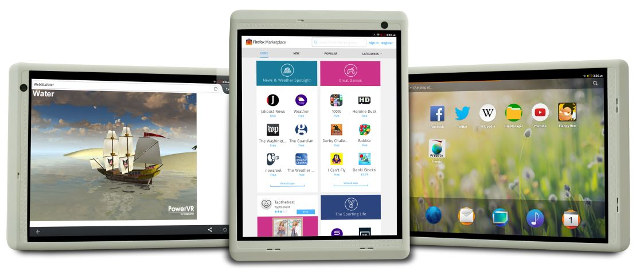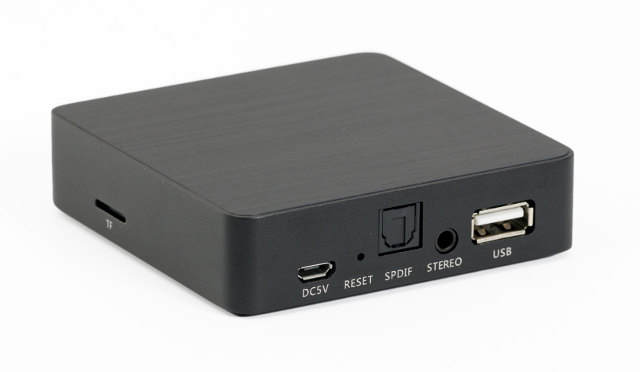When allegations surfaced that the NSA messed with devices manufactured by US companies, and possibly other, government of geopolitical significance started to take measures. For instance, China may have removed Apple and Cisco products from its list of approved products due to security reasons, and Russia decided to design its own Baikal processors to replace Intel and AMD solutions. At the time of the announcement, Baikal M and M/S chip were supposed to be the first ones and based on ARM Cortex A57 cores, but Imagination Technologies recently announced that Russia based Baikal Electronics was working on Baikal T1 communication processor with two MIPS P5600 cores. Some of the specifications include: CPU – Dual core MIPS 5600 processor @ 1.2 GHz with 1MB L2 cache Memory – DDR3 controller Storage – SATA 6Gbps controller and PHY Connectivity – 2x Gigabit Ethernet controller, 1x 10Gigabit Ethernet controller and PHY USB 2.0 […]
Samsung Artik is a Family of Arduino Compatible Boards for IoT Applications
There was a time when development boards were only reserved to companies, then boards like Arduino or Beagleboard made these available and affordable to consumers, and with the introduction of the Raspberry Pi, the maker movement grew even more rapidly, and many low cost boards started to be designed and manufactured mostly my smallest companies. But now larger companies like Intel or Qualcomm have jumped on the makers’ bandwagon, and the latest entry is Samsung with their Artik platform currently comprised of three boards that are programmable with the Arduino IDE. Let’s go through specifications for the three boards: Artik 1 SoC – Dual Core MIPS32 processor @ 250MHz (microAptiv UP) and 80MHz (microAptiv UC) without GPU Memory – 1MB RAM on-chip Storage – 4MB SPI flash Display – Up to WVGA (800×480) Connectivity – Bluetooth Low Energy with chip antenna Security – Secure element Sensor – 9-axis motion sensor […]
Linux 4.0 Release – Main Changes, ARM and MIPS Architectures
Linus Torvalds “Ima Sheep” released Linux Kernel 4.0 on Sunday: So I decided to release 4.0 as per the normal schedule, because there really weren’t any known issues, and while I’ll be traveling during the end of the upcoming week due to a college visit, I’m hoping that won’t affect the merge window very much. We’ll see. Linux 4.0 was a pretty small release both in linux-next and in final size, although obviously “small” is all relative. It’s still over 10k non-merge commits. But we’ve definitely had bigger releases (and judging by linux-next v4.1 is going to be one of the bigger ones). Which is all good. It definitely matches the “v4.0 is supposed to be a_stable_ release”, and very much not about new experimental features etc. I’m personally so much happier with time-based releases than the bad old days when we had feature-based releases. That said, there’s a few […]
Firefox OS Ported to MIPS Based Tablet (Ingenic JZ4780)
Imagination has announced that an experimental version of Firefox OS has been ported to a reference tablet powered by Ingenic JZ4780, a MIPS based processor, that’s also used in MIPS Creator CI20 development board, and that the company organized a raffle to send 15 of these tablets for people to try or develop on. The tablet is said to cost less than $100, runs either Firefox OS or Android 4.4 KitKat, and comes with the following specifications: SoC – Ingenic JZ4780 dual core MIPS32 processor @ 1.2 GHz with Imagination PowerVR SGX540 GPU. 32kI + 32kD per core, 512K shared L2. System Memory – N/A Storage – N/A Display – 9.7” screen; 1024 x 768 resolution Video Output – mini HDMI port Audio – Headphone jack, stereo speakers, microphone Connectivity – 802.11 b/g/n Wi-Fi, Bluetooth 4.0 USB – 1x Micro USB port Camera – Front and rear cameras Misc – […]
Ingenic Halley is a $20 Linux based IoT Board with Wi-Fi and Bluetooth 4.1 Connectivity
Ingenic introduced Newton2 platform for wearables a few months ago, and the kit with an AMOLED display, camera board and other accessories should go on sale in March for $80. In the meantime, the company has also been working on a lower cost internet of things (IoT) module and development kit powered by Ingenic M150 with Wi-Fi and Bluetooth 4.1 targeting smart appliances, Wi-Fi speakers, smart toys, industrial control applications, and other smart devices. Halley IoT module specifications: SoC – Ingenic M150 XBurst (MIPS) single-core processor up to 1.0GHz with 128MB LPDDR on-chip, 2D graphics GPU, VPU supporintg 720p30 H.264 video decoding. Storage – 8MP SPI NOR flash (GIGA GD25LQ64) Connectivity – Wi-Fi 802.11 b/g/n and Bluetooth 4.1 via Broadcom 43438 chip. Expansion headers (2mm pitch) 8-bit parallel LCD interface, Audio – MIC, Line-In and headphone, 2x I2S, SD card (MMC interface) USB device 2.0, and USB host 1.1 3x […]
Linux 3.19 Release – Main Changes, ARM and MIPS Architectures
Linus Torvalds released Linux Kernel 3.19 yesterday: So nothing all that exciting happened, and while I was tempted a couple of times to do an rc8, there really wasn’t any reason for it. Just as an example, Sasha Levin used KASan and found an interesting bug in paravirtualized spinlocks, but realistically it’s been around forever, and it’s not even clear that it can really ever trigger in practice. We’ll get it fixed, and mark it for stable, and tempting as it was, it wasn’t really a reason to delay 3.19. And the actual fixes that went in (see appended shortlog) were all fairly small, with the exception of some medium-sized infiniband changes that were all reverting code that just wasn’t ready. So it’s out there – go and get it. And as a result, the merge window for 3.20 is obviously also now open. Linus Linux 3.18 improved performance of […]
UyeSee SoundMate WM201 Wi-Fi Music Streamer Features Actions Semi AM8253 SoC
EZCast dongles are wireless display dongle supporting Miracast, DLNA, Airplay, and EZCast protocol, and are all based on Actions Semiconductor AM8251 MIPS processor. The company has now designed AM8253 SoC specially for audio applications using these standards, and found in upcoming products such as UyeSee WM201 Wi-Fi music streamer. UyeSee WM201 specifications and features: SoC – Actions Semi AM8253 32-bit RISC processor @ 600 MHz with built-in 24-bit 96 KHz DAC System Memory – 64 MB DDR3 Storage – 128MB for firmware, and micro SD card for audio files Connectivity – 802.11 b/g/n Wi-Fi (150 Max). WPA, WPA2, and WPA2 Mixed security Audio Ports – 3.5mm audio jack, optical S/PDIF Wireless Audio Standard – Airplay, DLNA, Qplay and Ezcast Audio Format – MP3, AAC, WAV, FLAC, APE, OGG, WMA, DTS, AC3 (Dolby Digital), ra, AIF, AIFF, M4A(ALAC), MKA, MIDI,, TTA USB – 1x USB host port, 1x micro USB port […]
Linux 3.18 Released
Linus Torvalds released Linux Kernel 3.18 last Sunday: It’s been a quiet week, and the patch from rc7 is tiny, so 3.18 is out. I’d love to say that we’ve figured out the problem that plagues 3.17 for a couple of people, but we haven’t. At the same time, there’s absolutely no point in having everybody else twiddling their thumbs when a couple of people are actively trying to bisect an older issue, so holding up the release just didn’t make sense. Especially since that would just have then held things up entirely over the holiday break. So the merge window for 3.19 is open, and DaveJ will hopefully get his bisection done (or at least narrow things down sufficiently that we have that “Ahaa” moment) over the next week. But in solidarity with Dave (and to make my life easier too 😉 let’s try to avoid introducing any _new_ […]








